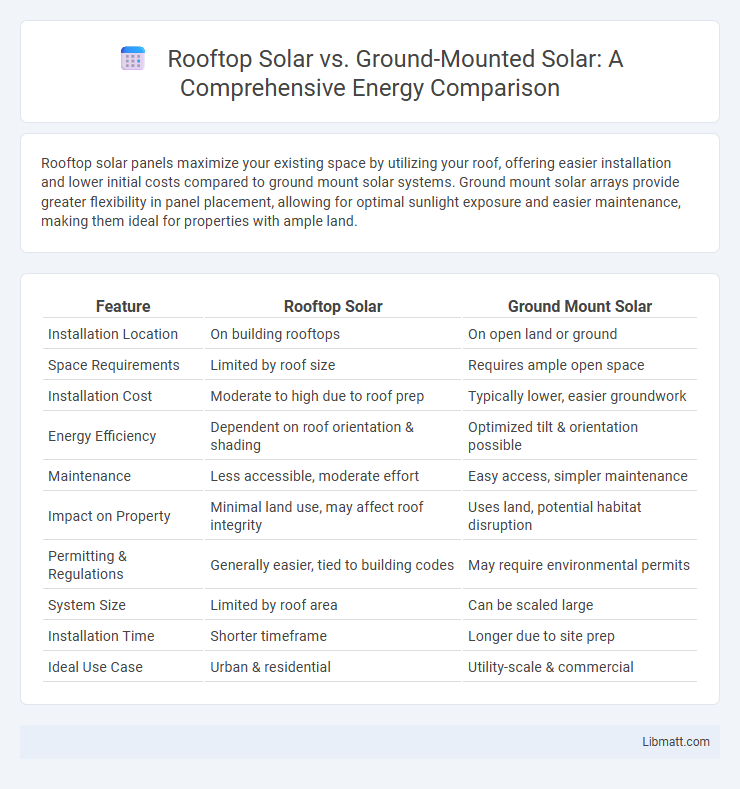Rooftop solar panels maximize your existing space by utilizing your roof, offering easier installation and lower initial costs compared to ground mount solar systems. Ground mount solar arrays provide greater flexibility in panel placement, allowing for optimal sunlight exposure and easier maintenance, making them ideal for properties with ample land.
Table of Comparison
| Feature | Rooftop Solar | Ground Mount Solar |
|---|---|---|
| Installation Location | On building rooftops | On open land or ground |
| Space Requirements | Limited by roof size | Requires ample open space |
| Installation Cost | Moderate to high due to roof prep | Typically lower, easier groundwork |
| Energy Efficiency | Dependent on roof orientation & shading | Optimized tilt & orientation possible |
| Maintenance | Less accessible, moderate effort | Easy access, simpler maintenance |
| Impact on Property | Minimal land use, may affect roof integrity | Uses land, potential habitat disruption |
| Permitting & Regulations | Generally easier, tied to building codes | May require environmental permits |
| System Size | Limited by roof area | Can be scaled large |
| Installation Time | Shorter timeframe | Longer due to site prep |
| Ideal Use Case | Urban & residential | Utility-scale & commercial |
Introduction to Rooftop and Ground Mount Solar
Rooftop solar installations utilize existing roof space, making them ideal for residential and commercial buildings with limited land area. Ground mount solar systems are installed on open land or designated ground areas, offering greater flexibility in panel orientation and size for optimal energy production. Both types harness solar energy efficiently but differ in installation complexity, cost, and space requirements.
Space and Installation Requirements
Rooftop solar systems maximize the use of existing roof space, making them ideal for properties with limited land area, while ground mount solar arrays require open, unobstructed ground space for installation. Rooftop installations typically have fewer zoning restrictions and benefit from existing elevation, but they require strong roof structures to support panel weight and proper orientation for sunlight exposure. Your choice depends on available space, structural capacity, and ease of maintenance, with ground mounts offering more flexibility in panel positioning and potential scalability.
Cost Comparison: Rooftop vs Ground Mount
Rooftop solar systems generally have lower installation costs due to existing structural support and reduced land preparation expenses, whereas ground mount solar requires additional expenses for mounting structures and site grading. Ground mount systems often facilitate easier maintenance and optimal panel positioning, potentially increasing energy output and long-term savings despite higher upfront costs. The total cost comparison depends heavily on factors like land availability, system size, and installation complexity, with rooftop solar offering cost-efficiency for limited space and ground mounts suited for larger installations.
Energy Efficiency and Power Output
Rooftop solar panels typically offer higher energy efficiency due to their proximity to the building's energy consumption point, reducing transmission losses. Ground mount solar systems allow for optimal angling and cooling, often resulting in higher overall power output compared to rooftop installations. Strategic placement of ground mounts can maximize solar exposure, improving energy capture and long-term system performance.
Maintenance and Accessibility
Rooftop solar systems offer easier accessibility for routine maintenance due to their proximity and integration with existing structures, reducing the need for extensive ground space. Ground mount solar installations allow for more straightforward cleaning and component replacement through open access, beneficial for larger arrays with heavy equipment. Both systems require regular inspection to maximize efficiency, but rooftop solar may face challenges with panel shading and limited space for maintenance activities.
Aesthetic and Property Impact
Rooftop solar panels integrate seamlessly with existing architecture, preserving open land and minimizing visual disruption, making them ideal for residential properties focused on maintaining curb appeal. Ground mount solar systems offer flexible placement and easier maintenance but may alter landscaping and reduce usable yard space, potentially impacting property aesthetics and value. Property owners must weigh rooftop installations' subtle integration against ground mounts' spatial and visual footprint when considering solar solutions.
Environmental Considerations
Rooftop solar panels minimize land use by utilizing existing structures, reducing habitat disruption and preserving green spaces. Ground mount solar systems often require clearing vegetation, which can impact local ecosystems but offer easier maintenance and optimal panel orientation. Your choice influences environmental trade-offs between land preservation and energy efficiency.
Permits and Regulatory Factors
Rooftop solar installations typically require fewer permits and face simpler regulatory processes compared to ground mount solar systems, which often demand extensive site assessments, zoning approvals, and environmental impact studies. Local building codes and homeowner association rules can also affect rooftop solar's permitting timeline, while ground mounts must comply with land use restrictions and setback regulations. Understanding these differences helps ensure your solar project meets all legal requirements and progresses smoothly.
Suitability for Residential or Commercial Use
Rooftop solar panels are ideal for residential or commercial buildings with limited space, offering efficient energy generation by utilizing existing roof areas. Ground mount solar systems provide flexibility for larger-scale commercial installations or homes with ample land, enabling easier maintenance and optimal panel orientation. Your choice depends on available space and energy needs, with rooftop solar fitting constrained urban environments and ground mounts suited for expansive properties.
Choosing the Best Solar Solution for Your Needs
Rooftop solar systems maximize space efficiency and are ideal for urban settings, offering direct integration with your home's electrical system. Ground mount solar installations provide greater flexibility in panel size, orientation, and maintenance access, making them suitable for larger properties with open land. Evaluating your available space, energy goals, and budget will help determine the best solar solution tailored to your needs.
Rooftop Solar vs Ground Mount Solar Infographic

 libmatt.com
libmatt.com